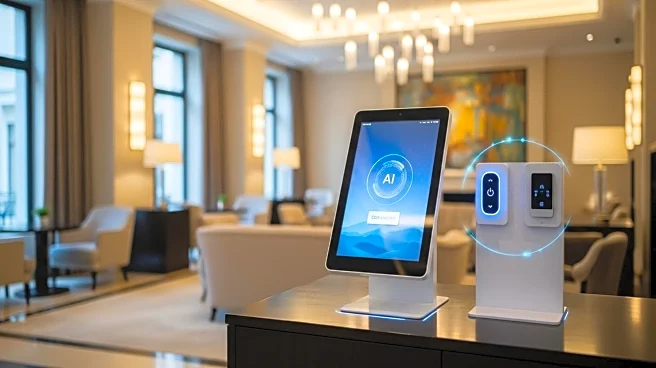What's Happening?
Hoteliers are increasingly utilizing AI-driven tools to improve guest interactions and boost revenue. AI platforms, such as those developed by Sojern, are transforming the hospitality industry by managing thousands of marketing campaigns daily and targeting millions of travelers. These platforms use machine learning to predict traveler behavior and booking likelihood, enhancing campaign efficiency and return on investment. AI is also being used to personalize guest experiences, from the planning stage of a trip to post-stay interactions. This includes AI-enabled concierges that automate guest inquiries and responses to reviews, allowing staff to focus on delivering personalized experiences. The integration of AI in hospitality marketing is reshaping traditional marketing funnels, emphasizing the importance of building authentic connections with guests.
Why It's Important?
The adoption of AI in the hospitality industry is significant as it offers a competitive edge in a rapidly evolving market. By leveraging AI, hoteliers can better understand and anticipate guest needs, leading to improved customer satisfaction and loyalty. This technological shift is crucial as travelers increasingly rely on AI tools for planning and booking trips, bypassing traditional marketing touchpoints. The ability to deliver personalized experiences not only enhances guest satisfaction but also boosts positive reviews, which are critical for visibility in AI-driven search results. As AI continues to evolve, it presents opportunities for hoteliers to optimize operations, reduce costs, and increase revenue, making it a vital component of modern hospitality strategies.
What's Next?
As AI technology advances, hoteliers are expected to further integrate these tools into their operations, enhancing guest experiences and streamlining marketing efforts. The focus will likely be on refining AI algorithms to better predict traveler behavior and preferences, allowing for even more personalized interactions. Additionally, the development of AI-driven advertising platforms, such as Google's Gemini, may offer new avenues for hoteliers to reach potential guests. The ongoing evolution of AI in hospitality will require hoteliers to continuously adapt and innovate to maintain competitive advantage and meet the growing expectations of tech-savvy travelers.
Beyond the Headlines
The integration of AI in hospitality raises ethical considerations regarding data privacy and the potential for reduced human interaction. As AI tools become more prevalent, hoteliers must ensure that guest data is handled responsibly and transparently. Additionally, while AI can enhance efficiency, it is essential to balance automation with human touch to maintain the personal connection that is central to hospitality. The long-term impact of AI on employment within the industry is also a consideration, as automation may shift job roles and require new skill sets.








